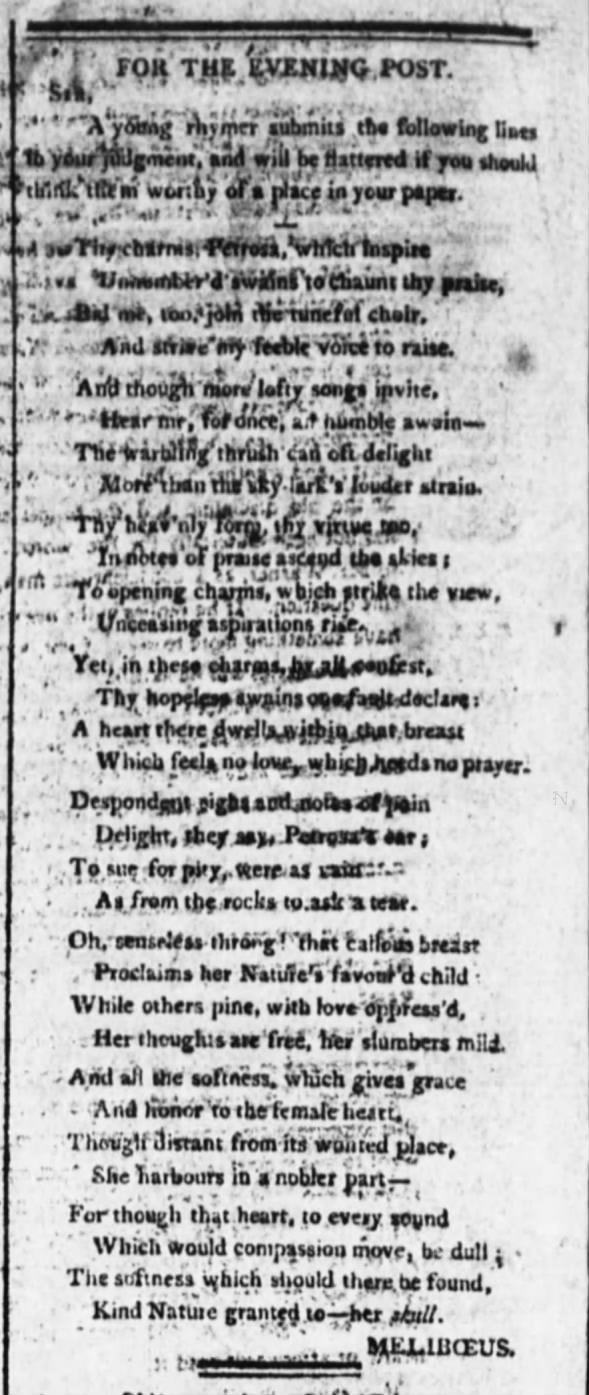"To Petrosa" by Clement C. Moore was collected in Moore's 1844 volume Poems where it appears on pages 92-94. A brief prose heading in the 1844 volume explains that "Petrosa" was
"Suggested by Goldsmith's stanzas which begin, "Say cruel Iris, pretty rake.""Lines to Petrosa" had appeared previously with other of Moore's poems over the signature "L." in John Duer's A New Translation, with Notes, of the Third Satire of Juvenal (New York, 1806). Here is an even earlier printing (the first, apparently) of "Petrosa," signed "Meliboeus" and published without any title in the New York Evening Post on May 9, 1804. To the Evening Post editor, Moore (still 24 in May 1804) described himself as "A young rhymer." The 1804 and 1806 versions of "Petrosa" both lack the 1844 allusion to Goldsmith's poem The Gift.
 · Wed, May 9, 1804 – Page 2 · The Evening Post (New York, New York) · Newspapers.com
· Wed, May 9, 1804 – Page 2 · The Evening Post (New York, New York) · Newspapers.com
FOR THE EVENING POST.
Sir,
A young rhymer submits the following lines to your judgment, and will be flattered if you should think them worthy of a place in your paper.
Thy charms, Petrosa, which inspire
Unnumber'd swains to chaunt thy praise,
Bid me, too, join the tuneful choir,
And strive my feeble voice to raise.
And though more lofty songs invite,
Hear me, for once, an humble swain--
The warbling thrush can oft delight
More than the sky lark's louder strain.
Thy heav'nly form, thy virtue too,
In notes of praise ascend the skies;
To opening charms, which strike the view,
Unceasing aspirations rise.
Yet, in these charms, by all confest,
Thy hopeless swains one fault declare:
A heart there dwells within that breast
Which feels no love, which heeds no prayer.
Despondent sighs and notes of pain
Delight, they say, Petrosa's ear;
To sue for pity, were as vain
As from the rocks to ask a tear.
Oh, senseless throng! that callous breast
Proclaims her Nature's favour'd child
While others pine, with love oppress'd,
Her thoughts are free, her slumbers mild.
And all the softness, which gives grace
And honor to the female heart,
Though distant from its wonted place,
She harbours in a nobler part--
For though that heart, to every sound
Which would compassion move, be dull;
The softness which should there be found,
Kind Nature granted to--her skull.
MELIBOEUS.
Related:

No comments:
Post a Comment